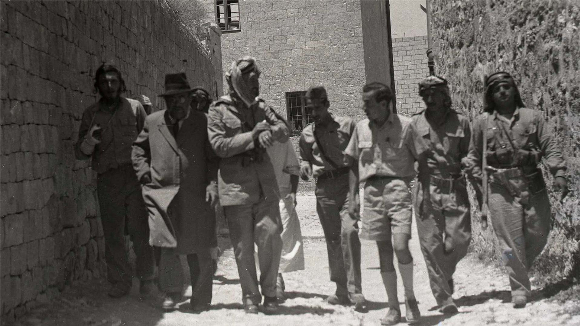 Israel, Switzerland 2008, 52 min, SD
Israel, Switzerland 2008, 52 min, SDA Belfilms Production
by Liran Atzmor
Jerusalem Cuts
One war, ten days, three stories: the Old City of Jerusalem, at the dawn of a new Middle East. For the Brits, it’s the shameful end of 30 years Mandate. For the Jews, it’s the birthday of their State. And for the Palestinians, it’s a catastrophe. Only now, 60 years later, images can be shown from three opposing points of view, telling a whole new story.John Phillips was one of the first photo journalists in the world, assigned by the Life magazine editor to report on the war in Jerusalem. He attached himself to the Jordanian army but became compelled by the Jewish perspective. He made passionate and emotional pictures of the evacuation of the Jews of the Old City.
Jack Padwa is the producer of the first major fiction film of the country. Coming from a right wing Jewish British family he produced the Israeli ‘Birth Of A Nation’ in 1955, telling the story of the Jews in the Old City of Jerusalem from his point of view. The film, premiered to much acclaim at the Cannes Film Festival, turned out to be a commercial flop, but became a myth of the Israeli independence war.
Ali Zaarour was one of the few photographers who documented the Palestinian side of the story. The first Moslem stills photographer shows the tragedy of the Palestinian ‘Naqba’ (Catastrophe) in the 1948 War in a unique collection. The Zaarour family holds a photography studio lab in the Old City until today.
The three protagonists of the film are from three different generations. Jack is 92 years old, his son is taking him on a flight to Jerusalem for his birthday. Throughout, Jack recalls his memories from the times he shot his film. John Phillips’ step-grandson tells about his grandfather through a tour in the photographer’s small New York studio. And Ali Zaarours’ son comes from his West Bank town, El Azariya, to the Israeli military archive in Tel Aviv, where the original album of his father, was recently discovered. For 40 years, this album was thought to be lost in the war.
The film’s structure is a triptych, the three stories are told separately and simultaneously, one next to the other, just like they really happened in reality. What remains of the “real” story of that war? Just how important are pictures to the survival of one story and how does that account for the destruction of the other? Jerusalem Cuts wanders between fiction and reality, looking for some sparks of truth about what really happens when narratives interweave. Does the best story win?
Special Screening DocAviv, Nyon (comp.), Toronto
